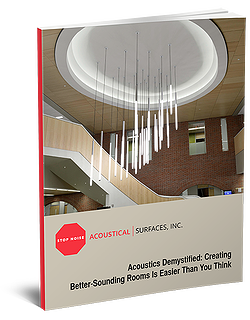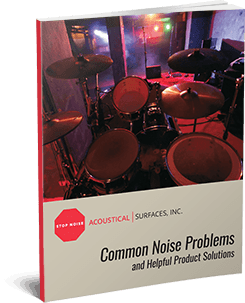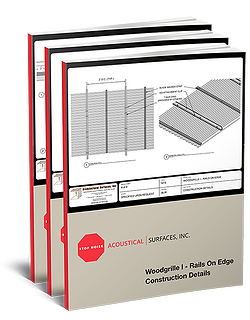The Benefits of Commercial Soundproofing
When building or renovating a commercial space, soundproofing can be easily overlooked. With all the focus on how a place is going to look, how a place sound isn’t always considered—but it should be.
Commercial soundproofing comes in many forms and does a great deal of work to create an environment conducive to productivity, effective communication, and privacy. No matter the industry, taking the time to factor the sonic landscape of a property into your plans will pay dividends in the future.
How Does Commercial Soundproofing Work?
When a layman refers to soundproofing, they are often talking about a variety of sound control measures. In general, soundproofing means controlling the vibrations that make sound and where they go. To do that in a commercial setting, several techniques are employed, including sound absorption, soundproofing, and controlling sound distribution.
The needs of a commercial space depend largely on what kind of space it is. A dedicated office building will have different requirements than an apartment building or a building made for both offices and production facilities—and all of them have different requirements than a theater or cinema.

Some issues are fairly universal. Limiting noise from pipes and HVAC systems is important for any commercial space, be it residential, offices, or retail. And though the amount of noise varies from space to space, controlling volume in public spaces and preventing noise from bleeding through from one space to another are universal issues that must be considered when designing a commercial area.
Common Sound Issues In Commercial Spaces
Some of the most common issues that commercial soundproofing addresses don’t seem like they would be as problematic as they are. The thing to remember is that none of these issues occur in a vacuum. Any combination or persistent build-up of any of these problems can lower the value of your property by making it less desirable to be in.
Whether putting together an office, apartments, or performance spaces, controlling where the sound goes is important. A movie theater can’t have sounds from different screens competing with each other and expect to stay in business. Meeting spaces need to be able to maintain sonic separation so that client presentations don’t get ruined by chatter from the rest of the office and so that private conversations can stay private. And no one wants to live in an apartment with “thin walls.” There are some activities that a person does in the privacy of their home that they would like to remain private, after all.
Buildings themselves also create noise. Whether those noises come from machines and systems within the building or because of outside factors, structural noises can be frustrating for several reasons.
Persistent buzzing or rattling is a major distraction and can hinder productivity. Additionally, trying to communicate in an environment with constant underlying noise forces people to raise their voices, which leads to a vicious cycle of people constantly speaking louder to be heard over everyone else.
Because of the way soundwaves reflect off surfaces, there are parts of a room that can feel louder than the others. This can happen in any type of commercial space. Controlling the flow of sound is especially important in a performance space where ensuring that a packed crowd can hear everything from the stage is key, but it’s also important in an office. While a theater needs sound to be expansive, an office needs to direct sound in such a way that everyone can do their work in peace.
Which Businesses Can Benefit From Soundproofing?
The soundproofing needs of every business out there are unique. The only thing they all have in common is all the shades of noise pollution lurking throughout your workspaces. Noise control is an important aspect of modern-day businesses because recent studies have shown that long term exposure to dangerous decibels can impact your workers more than you think.
If your employees are exposed to higher noise levels it can lead to some serious health concerns: hearing loss, fatigue, and high blood pressure. Noise puts the entire nervous system into a state of acute alertness.

Human ears are always working overtime. Even when we are in a state of rest, our ears are catching everything—even some things that we are not aware of. It is estimated that businesses can lose millions of dollars because their team members are stressed and taking their sick leave much more often.
It is basic math—if you want to improve your workspaces and lift productivity and team spirits, it is better to invest in commercial soundproofing than lose money year over year.
When you start thinking about commercial soundproofing cost—it may involve a big upfront investment but it will provide a big return on that investment if you look at the productivity levels and notice that the atmosphere at the work is not stressful as it was.
Not to mention, the peace of mind that comes with actually being able to hear yourself think cannot be underestimated.
Aerial noise, traffic noise, and construction noise are just some of the types of noise you have to contend with. Noise from your neighbors and coworkers can also be problematic.
When you are thinking about soundproofing commercial spaces, you can’t think about treating fitness clubs, recording studios, and churches the same way.
So which business can benefit from soundproofing? The short answer is all of them. Different steps can be taken to address different needs depending on noise levels, building materials, spaces, and the overall environment.

Higher Noise Levels: Part Of An Everyday Work Routine?
Restaurants, hotels, and fitness centers have a reputation for a higher level of noise. But if your customers experience higher noise levels, it can affect their overall satisfaction with your business. It will lead to some bad reviews, no matter how great your service is or how modern your spaces look. Luckily, modern commercial soundproofing options are also visually appealing and can fit into any design aesthetic—whether you like a more minimalist look or a more rustic feel.
Call centers also have specific needs in the commercial business world. Employees need to be focused on talking to their customers, but they have to deal with noise coming from every direction. Coworkers are also talking to clients, electric equipment is buzzing, and you have noise coming through the windows. In these noisy environments, it is hard to maintain your train of thought without being distracted.
When thinking about solving this complex problem, the first step will be the application of sound-absorbing desk partitions. This will also be great for keeping social distance in the post-covid era. If the noise problem keeps occurring you should think about hiring a commercial soundproofing contractor that will know how to make the best of your spaces.
Similar cases are found in dog shelters, warehouses, and manufacturing facilities—they are often placed outside of residential areas yet the sonic environment can be extremely overwhelming for their employees. Since aesthetics are not necessarily a major concern in these types of businesses, you should think more practically. Soundproofing floors and ceilings, using acoustic curtains and different commercial soundproofing materials such as rubber, wool, or mass loaded vinyl will often do the trick.
Echo Problems In Churches And Auditoriums
Some businesses require a more complex approach to their soundproofing efforts. In churches, indoor pools, and auditoriums you need to strategize with sound. Surfaces in these types of spaces are very different from the ones we see in offices or industrial environments.
In these types of spaces, It is all about sound balancing. Customers may experience issues with an echo which could be extremely unpleasant at the times. If someone is giving a speech in an auditorium, too much echo will not only annoy some audience members—it can make it very difficult to hear what is being said in the first place.
In these spaces, you don’t need to reduce every sound. You need to ensure sound clarity more.
Silence, Please!
Last but not least, it is important to bring up libraries, studios, and conference rooms. Creating quiet environments for research, recording, or business presentations brings unique challenges.
Fortunately, soundproof and acoustic treatment options are numerous to create an amazing sound of silence where your studies can commence easily, your recordings can be made without any issues, and where your business meetings can go smoothly and without any distractions.
What Are The Benefits Of Commercial Soundproofing?
The first benefit is peace of mind and body for the people in your spaces. Since the wellbeing of your employees comes first and they are the very core of what you do—decreasing noise levels must be a priority. This will improve overall workspace satisfaction and improve your productivity levels while reducing the physical and mental strains that can be brought on by persistent noise.
Some types of noise can’t be avoided but can be drastically reduced and masked.
Starting a soundproofing project for your commercial business can help you comply with regulations for building codes and they can reduce health concerns connected with noise pollution.
Solutions To Common Issues
While all of these issues can cause problems in your commercial space, they can all be addressed with the right materials. Some issues can be resolved with minimal work, some may require a degree of renovation if your space is already in operation. But each of these solutions will improve the sonic landscape of your space in both obvious and subtle ways.
Airborne Noise
Airborne Noise originates outside of a building or room. This could be something like the sound of traffic coming in from outdoors or loud conversations or music bleeding into a conference room from a common space in an office.
Perhaps the best way to combat airborne noise is by installing batt insulation like UltraTouch. Batt insulation absorbs sound waves as they permeate otherwise sound-porous materials like drywall or other common building materials.
Impact Noise
Another source of noise that batt insulation addresses is impact noise — the noise from objects colliding together. Impact noise can come from large machines and appliances vibrating as they operate or even something as simple and common as footsteps.
Those sounds can bleed through walls that have not been properly insulated to deal with noise as well as through ceilings from people moving around above you. Batt insulation can be used between floors as well as inside walls.
Additionally, some impact noises require specialized solutions. For example, pipes may cause a great deal of noise that batt insulation only partially reduces. Mass loaded vinyl external pipe lagging wraps around pipes to both provide thermal insulation and combat intrusive noises.
Structural Vibrations
The physics of sound shows us that vibrations in a material can then travel through the air to be interpreted by our ears. When you sit in a building and hear a persistent rattling or buzzing sound, that is the materials that make up the building vibrating.
Whether the source of the vibrations is external like an airplane flying low overhead on the way to land or internal like an HVAC system, dealing with the noise of structural vibrations will make communication and focus easier for the occupants of your commercial space.
When looking to reduce or eliminate structural vibration as much as possible, you must first find the source of the vibrations so you know how to address the issue. If it is a result of a loud HVAC system, products like Air Duct Noise Silencers may be right for you. If your issue is tied to external sources rattling the bones of your building, Acoustic sound damping material or products designed to decouple beams and studs from your walls and ceilings may help you.
Commercial soundproofing ceiling insulation is very practical, especially if you are sharing a building with other businesses.
The key is to consult with people who are knowledgeable about sound and how it affects a building and workspace. A unique space may demand a much simpler solution than the ones mentioned above, but you won’t know unless you check with an expert.

Doors
Where air can enter a space, so can sound. That means doors are a huge source of sound bleed. Whether your commercial space is a theater, an office, a factory, or an apartment building, there are important reasons for you to make sure your doors aren’t gateways for problems.
By investing in easy-to-install door seals, you can reduce door-related sound issues. Installing seals on external doors has the added benefit of improving insulation against the elements and saving money thanks to better energy efficiency.
Of course, when building or renovating, you can forgo installing door seals and jump straight to installing soundproof doors. Considering your tenants’ sound needs before the project is complete can become a selling point when your space is on the market.
Floors
When your property has multiple floors, chances are good that the people using the lower floors will be annoyed by the footfalls of the people above them. Using batt insulation between floors does a great deal of work, but installing floor underlays as well improves the situation exponentially.
Floor underlays also provide another layer of sound absorption to help prevent bleed from airborne noise. Whether that noise is coming from above or below, having an extra layer of material helps keep conversations private.
Reverberation
Within a space, reverberation creates a lot of ambient sounds that people must contend with to communicate with each other. It can be loud and distracting, reducing productivity in offices—especially those with open floor plans.
One of the best tools you can use to control reverberation in a commercial space is sound absorption. Installing commercial acoustic panels strategically throughout a space will clear the air of noise pollution and allow for improved sound quality and less distraction.
Unique Needs, Unique Solutions
While almost every commercial space will have at least a few of these problems, each space is unique. There is no one-size-fits-all solution to acoustic issues. It’s important to consider sound early in the project rather than after all the walls are up.
Balancing hard and soft surfaces can help control sound movement. How well do you want the sound to carry? Are there parts of your space that you want to be more acoustically lively for public speaking or performance? Are there areas that you want to reduce reverberation so that quiet conversations are more easily held?
Remember that one sound decision is keeping you from transforming your spaces. Sound is an important ingredient wherever you go and it plays an important role when it comes to leaving a lasting impression on your potential customers and partners.
In Conclusion
Every acoustic issue has a solution. While total elimination of unwanted sounds is probably outside the bounds of possibility, you can reduce your problems with knowledge and foresight.
There are many commercial soundproofing companies out there but we offer both experience and great, environmentally sound solutions. All our clients have unique stories and we worked hard to give those stories happy endings. They picked the solution and we made the most of it.
By consulting with experts to cut off sound issues before they become full-blown problems you can improve client satisfaction and drive up the value of your commercial property quickly. There are many ways to address acoustic issues. Find the right solutions for you.



